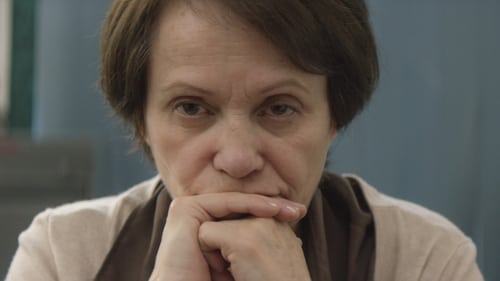Natalia Almada
Nascimento : 1974-01-01, Mexico City, Mexico
História
Natalia Almada is a Mexican-American photographer and filmmaker. Her work as a filmmaker focuses on Mexican history, politics, and culture in insightful and poetic films that push the boundaries of how the documentary form addresses social issues. (Wikipedia)

Producer
A mother wonders, will my children love their perfect machines more than they love me, their imperfect mother? She switches on a smart-crib lulling her crying baby to sleep. This perfect mother is everywhere. She watches over us, takes care of us. We listen to her. We trust her.

Editor
A mother wonders, will my children love their perfect machines more than they love me, their imperfect mother? She switches on a smart-crib lulling her crying baby to sleep. This perfect mother is everywhere. She watches over us, takes care of us. We listen to her. We trust her.

Director
A mother wonders, will my children love their perfect machines more than they love me, their imperfect mother? She switches on a smart-crib lulling her crying baby to sleep. This perfect mother is everywhere. She watches over us, takes care of us. We listen to her. We trust her.

Director
A global portrait documenting the year's events, Cinetracts '20 features the work of an international lineup of 20 filmmakers. Capturing the zeitgeist in their own backyard, the artists' short films are the culmination of a year-long residency project.

Producer
Marina and Perla join thousands of women on an annual Catholic pilgrimage. Perla's coming of age accentuates a generational divide as she struggles to assert her independence as a woman.

Screenplay
After 35 years working as a clerk in a government office, Doña Flor has become such a cog, invisible to herself. Cloaked in solitude and routine, she has even suppressed the loss of her daughter who drowned years ago. As her retirement approaches the walls of bureaucracy that have sheltered her from her pain begin to crumble. Doña Flor’s sense of self begins to awaken in parallel with the country beginning to erupt from excessive violence and corruption.

Director
After 35 years working as a clerk in a government office, Doña Flor has become such a cog, invisible to herself. Cloaked in solitude and routine, she has even suppressed the loss of her daughter who drowned years ago. As her retirement approaches the walls of bureaucracy that have sheltered her from her pain begin to crumble. Doña Flor’s sense of self begins to awaken in parallel with the country beginning to erupt from excessive violence and corruption.

Director of Photography
Marthas is a PBS documentary about an extraordinary rite of passage in Laredo, Texas where teenage Mexican-American girls debut in a grand Colonial Ball dressed as American revolutionaries - a tradition that goes back 114 years.

Director
From dusk 'til dawn, El Velador accompanies Martin, the guardian angel whom, night after night, watches over the extravagant mausoleums of some of Mexico's most notorious Drug Lords. In the labyrinth of the cemetery, this film about violence without violence reminds us how, in the turmoil of Mexico's bloodiest conflict since the Revolution, ordinary life persists and quietly defies the dead.

Writer
The glimpse into the life of Mexican President Plutarco Elias Calles.
Past and present collide as filmmaker Natalia Almada brings to life audio recordings she inherited about her great-grandfather, General Plutarco Elías Calles, a revolutionary general who became president of Mexico in 1924. Time is blurred in this visually arresting portrait of a family and country living under the shadows of the past.

Director
The glimpse into the life of Mexican President Plutarco Elias Calles.
Past and present collide as filmmaker Natalia Almada brings to life audio recordings she inherited about her great-grandfather, General Plutarco Elías Calles, a revolutionary general who became president of Mexico in 1924. Time is blurred in this visually arresting portrait of a family and country living under the shadows of the past.

Editor
Told using Mexico's 200 year-old tradition of corrido music, To The Other Side recounts the story of an aspiring corrido composer facing two life-changing choices: to traffic drugs or unlawfully cross the border into the United States.

Director
Told using Mexico's 200 year-old tradition of corrido music, To The Other Side recounts the story of an aspiring corrido composer facing two life-changing choices: to traffic drugs or unlawfully cross the border into the United States.

Director
An experimental documentary about a family's loss of a child and the struggle between remembrance and forgetting. The film explores the cultural differences between a North American mother and a Mexican father in the face of death.

Editor
Bajo el Tacaná follows the lives of several migrant women as they are arrested in control posts and hostels across Mexico´s southern border, in the Soconusco region, run the risk of being deported at a migrant station in Tapachula, and visit places where they are forced or lured into prostitution by the Mexican authorities. Bajo el Tacaná uses the migrant´s testimonies and first-hand accounts from bystanders, such as a taxi driver in Tapachula and a doctor who tends the prostitutes to chronicle the atrocities that take place in the Mexico- Guatemala border. Voice-over adds meaning to the film, while the music conveys what we couldn´t or wouldn´t dare to record on video.

Production Manager
Produced by the Museum of Contemporary Art Toronto; Arts at CERN, the arts program of the European Laboratory of Particle Physics, Geneva, with the support of the Permanent Mission of the United States to the United Nations, Geneva; Sprengel Museum, Hannover, with the support of Niedersächsische Sparkassenstiftung; and New Museum, New York



